See how to use VBScript to create an Outlook signature, personalize it with user data and distribute throughout a company.
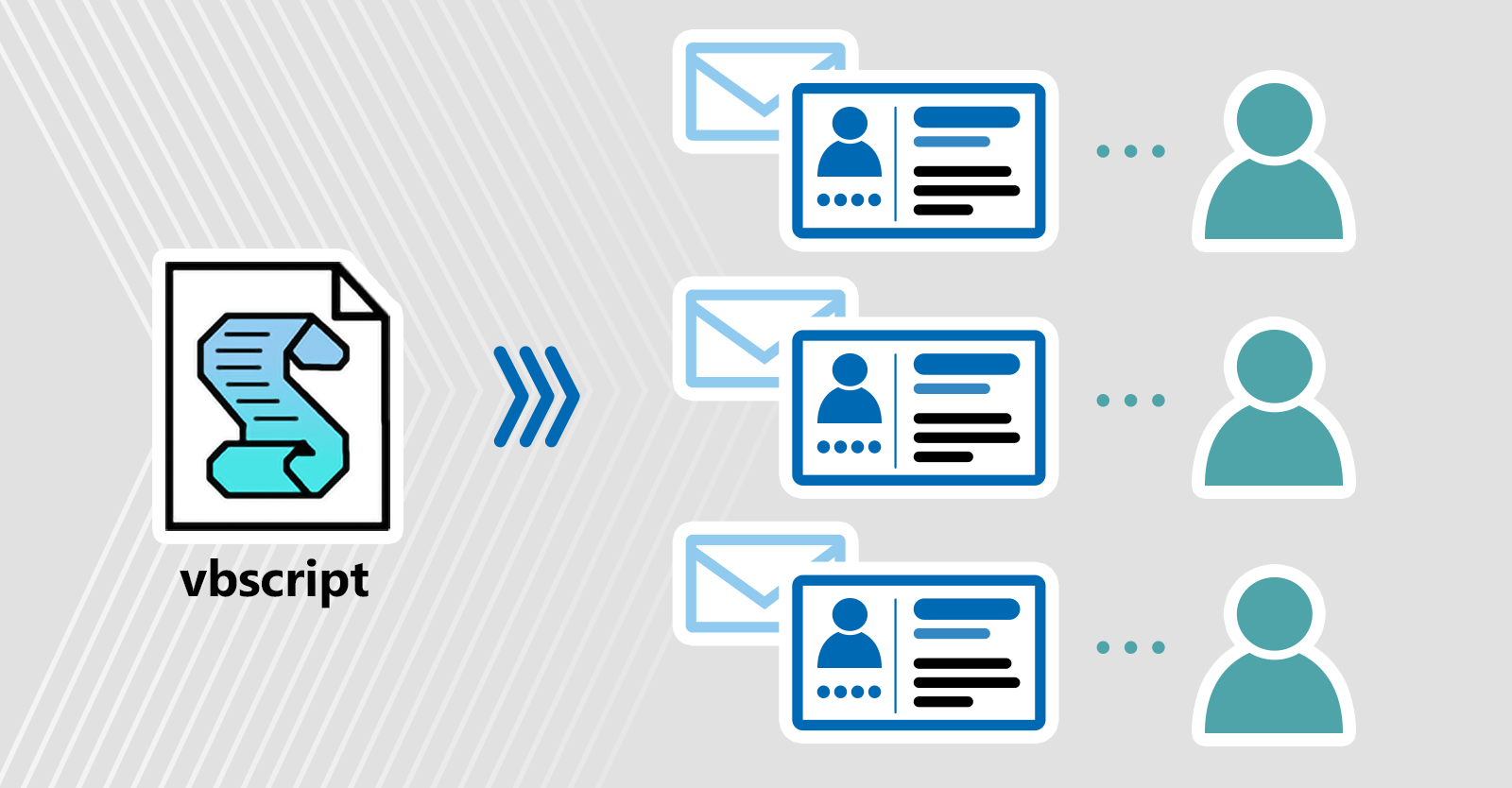
[Update]: This article was updated on November 4, 2024. While the methods in this article still work, there are two issues that can potentially make it a lot less useful: VBScript’s end of life and Outlook’s signature cloud settings.
In one of my other articles, I’ve shown how to create simple email signatures in Outlook using VBScript. In this article, I will show you how to take your email signatures to a higher level. I will use VBScript to create an HTML email signature for every Outlook (for Windows) installation in your organization. The script will create a professional email signature with data taken from Active Directory. Next, I will explain how to use GPO to distribute the script to every user in your organization.
- Before you start
- Creating HTML with VBScript
- Sample VBScripts
- Creating your own script
- Deploying the script for a single user
- Deploying the script for multiple users
- Professional email signature management
Before you start
VBScript lets you create personalized email signatures for the whole company from a single template. That’s a pretty solid solution to a common business need. But there are two considerable obstacles that can make this method useless for you:
- VBScript is reaching its end of life.
- Limited email client support – this method to automatically apply signatures only works in the classic Outlook for Windows, and only with the signature cloud settings turned off. The generative part of the script requires a connection to the local AD. If you’re a cloud-only organization, it won’t work at all.
For a complete list of limitations and ways to combat them, go to the Professional email signature management section.
Creating HTML with VBScript
Before you proceed, a short explanation about creating an HTML file with VBScript. Both VBScript and HTML languages use double quotation marks (“) as the default characters for specifying data input. That generates a problem, at least in this scenario. If you try to use single quotation marks for data input in VBScript, you will end up in converting the entire script into a single huge comment. There are two methods which will let us work around this issue:
- Adding & “”” after each double quotation mark found in HTML code (method used in Script 1). Just be sure to add a space before the & character as well.
- Changing all double quotation marks to single quotation marks in HTML code (method used in Script 2).
I prefer method 2, as it results in a cleaner code and it’s easy to use e.g. Notepad to replace all ” with ‘ in a source HTML file.
In addition to those methods, you could use only a single WriteLine method and create one-line HTML code. Although it might make the method used in Script 2 slightly easier, you will greatly decrease readability of your code.
Sample VBScripts
First, you need to create a script which will create a personalized HTML email signature for each user. Below, I will present two different sample scripts which create two different signature templates. Those samples use slightly different methods to generate HTML code.
The base HTML code for signature templates originates from the free email signature generator.
Important! Both scripts include a section with global placeholders. They relate to data that should be identical for every user (company address, social media websites, etc.). Make sure to replace their values with your company’s data.
Script 1
The first sample script will let you create the following signature template:

On Error Resume Next 'Setting up the script to work with the file system. Set WshShell = WScript.CreateObject("WScript.Shell") Set FileSysObj = CreateObject("Scripting.FileSystemObject") 'Connecting to Active Directory to get user’s data. Set objSysInfo = CreateObject("ADSystemInfo") Set UserObj = GetObject("LDAP://" & objSysInfo.UserName) strAppData = WshShell.ExpandEnvironmentStrings("%APPDATA%") SigFolder = StrAppData & "\Microsoft\Signatures\" SigFile = SigFolder & UserObj.sAMAccountName & "1.htm" 'Setting placeholders for the signature. strUserName = UserObj.sAMAccountName strFullName = UserObj.displayname strTitle = UserObj.title strMobile = UserObj.mobile strEmail = UserObj.mail strCompany = UserObj.company strOfficePhone = UserObj.telephoneNumber 'Setting global placeholders for the signature. Those values will be identical for all users - make sure to replace them with the right values! strCompanyLogo = """https://codetwocdn.azureedge.net/images/mail-signatures/generator-dm/simplephoto-with-logo/logo.png" strCompanyAddress1 = "16 Freedom St, Deer Hill" strCompanyAddress2 = "58-500 Poland" strWebsite = """https://www.my-company.com" strFacebook = """https://www.facebook.com/" strTwitter = """https://www.twitter.com/" strYouTube = """https://www.youtube.com/" strLinkedIn = """https://www.linkedin.com/" strInstagram = """https://www.instagram.com/" strPinterest = """https://www.pinterest.com/" 'Creating HTM signature file for the user's profile, if the file with such a name is found, it will be overwritten. Set CreateSigFile = FileSysObj.CreateTextFile (SigFile, True, True) 'Signature’s HTML code. CreateSigFile.WriteLine "<!DOCTYPE HTML PUBLIC " & """-//W3C//DTD HTML 4.0 Transitional//EN" & """>" CreateSigFile.WriteLine "<HTML><HEAD><TITLE>Email Signature</TITLE>" CreateSigFile.WriteLine "<META content=" & """text/html; charset=utf-8" & """ http-equiv=" & """Content-Type" & """>" CreateSigFile.WriteLine "</HEAD>" CreateSigFile.WriteLine "<BODY style=" & """font-size: 10pt; font-family: Arial, sans-serif;" & """>" CreateSigFile.Writeline "<table style=" & """width: 420px; font-size: 10pt; font-family: Arial, sans-serif;" & """ cellpadding=" & """0" & """ cellspacing=" & """0" & """>" CreateSigFile.Writeline "<tbody>" CreateSigFile.Writeline "<tr>" CreateSigFile.Writeline "<td width=" & """130" & """ style=" & """font-size: 10pt; font-family: Arial, sans-serif; border-right: 1px solid; border-right-color: #008080; width: 130px; padding-right: 10px; vertical-align: top;" & """ valign=" & """top" & """ rowspan=" & """6" & """> <a href=" & strWebsite & """ target=" & """_blank" & """><img border=" & """0" & """ alt=" & """Logo" & """ width=" & """110" & """ style=" & """width:110px; height:auto; border:0;" & """ src=" & strCompanyLogo & """></a>" CreateSigFile.Writeline "</td>" CreateSigFile.Writeline "<td>" CreateSigFile.Writeline "<table cellpadding="& """0"& """ cellspacing="& """0"& """>" CreateSigFile.Writeline "<tbody>" CreateSigFile.Writeline "<tr>" CreateSigFile.Writeline "<td style="& """font-size: 10pt; color:#0079ac; font-family: Arial, sans-serif; width: 305px; padding-bottom: 5px; padding-left: 10px; vertical-align: top; line-height:25px;"& """ valign="& """top"& """>" CreateSigFile.Writeline "<strong><span style="& """font-size: 14pt; font-family: Arial, sans-serif; color:#008080;"& """>" & strFullName & "<br></span></strong>" CreateSigFile.Writeline "<span style="& """font-family: Arial, sans-serif; font-size:10pt; color:#545454;"& """>" & strTitle & "</span>" CreateSigFile.Writeline "<span style="& """font-family: Arial, sans-serif; font-size:10pt; color:#545454;"& """> | </span>" CreateSigFile.Writeline "<span style="& """font-family: Arial, sans-serif; font-size:10pt; color:#545454;"& """>" & strCompany & "</span>" CreateSigFile.Writeline "</td>" CreateSigFile.Writeline "</tr>" CreateSigFile.Writeline "<tr>" CreateSigFile.Writeline "<td style="& """font-size: 10pt; color:#444444; font-family: Arial, sans-serif; padding-bottom: 5px; padding-top: 5px; padding-left: 10px; vertical-align: top;"& """ valign="& """top"& """>" CreateSigFile.Writeline "<span><span style="& """color: #008080;"& """><strong>m:</strong></span><span style="& """font-size: 10pt; font-family: Arial, sans-serif; color:#545454;"& """>" & strMobile & "<br></span></span>" CreateSigFile.Writeline "<span><span style="& """color: #008080;"& """><strong>p:</strong></span><span style="& """font-size: 10pt; font-family: Arial, sans-serif; color:#545454;"& """>" & strOfficePhone & "<br></span></span>" CreateSigFile.Writeline "<span><span style="& """color: #008080;"& """><strong>e:</strong></span><span style="& """font-size: 10pt; font-family: Arial, sans-serif; color:#545454;"& """>" & strEmail& "</span></span>" CreateSigFile.Writeline "</td>" CreateSigFile.Writeline "</tr>" CreateSigFile.Writeline "<tr>" CreateSigFile.Writeline "<td style="& """font-size: 10pt; font-family: Arial, sans-serif; padding-bottom: 5px; padding-top: 5px; padding-left: 10px; vertical-align: top; color: #0079ac;"& """ valign="& """top"& """>" CreateSigFile.Writeline "<span style="& """font-size: 10pt; font-family: Arial, sans-serif; color: #008080;"& """>" & strCompanyAddress1 & "<span><br></span></span>" CreateSigFile.Writeline "<span style="& """font-size: 10pt; font-family: Arial, sans-serif; color: #008080;"& """>" & strCompanyAddress2 &"</span>" CreateSigFile.Writeline "</td>" CreateSigFile.Writeline "</tr>" CreateSigFile.Writeline "<tr>" CreateSigFile.Writeline "<td style="& """font-size: 10pt; font-family: Arial, sans-serif; padding-bottom: 5px; padding-top: 5px; padding-left: 10px; vertical-align: top; color: #0079ac;"& """ valign="& """top"& """>" CreateSigFile.Writeline "<a href="& """https://www.my-company.com"& """ target="& """_blank"& """ rel="& """noopener"& """ style="& """text-decoration:none;"& """><span style="& """font-size: 10pt; font-family: Arial, sans-serif; color: #008080;"& """>www.my-company.com</span></a>" CreateSigFile.Writeline "</td>" CreateSigFile.Writeline "</tr>" CreateSigFile.Writeline "<tr>" CreateSigFile.Writeline "<td style="& """font-size: 10pt; font-family: Arial, sans-serif; padding-bottom: 5px; padding-top: 5px; padding-left: 10px; vertical-align: top;"& """ valign="& """top"& """>" CreateSigFile.Writeline "<span><a href="& strFacebook & """ target="& """_blank"& """ rel="& """noopener"& """><img border="& """0"& """ width="& """21"& """ alt="& """facebook icon"& """ style="& """border:0; height:21px; width:21px"& """ src="& """https://codetwocdn.azureedge.net/images/mail-signatures/generator-dm/simplephoto-with-logo/fb.png"& """></a> </span><span><a href="& strTwitter & """ target="& """_blank"& """ rel="& """noopener"& """><img border="& """0"& """ width="& """21"& """ alt="& """twitter icon"& """ style="& """border:0; height:21px; width:21px"& """ src="& """https://codetwocdn.azureedge.net/images/mail-signatures/generator-dm/simplephoto-with-logo/tt.png"& """></a> </span><span><a href="& strYouTube & """ target="& """_blank"& """ rel="& """noopener"& """><img border="& """0"& """ width="& """21"& """ alt="& """youtube icon"& """ style="& """border:0; height:21px; width:21px"& """ src="& """https://codetwocdn.azureedge.net/images/mail-signatures/generator-dm/simplephoto-with-logo/yt.png"& """></a> </span><span><a href="& strLinkedIn & """ target="& """_blank"& """ rel="& """noopener"& """><img border="& """0"& """ width="& """21"& """ alt="& """linkedin icon"& """ style="& """border:0; height:21px; width:21px"& """ src="& """https://codetwocdn.azureedge.net/images/mail-signatures/generator-dm/simplephoto-with-logo/ln.png"& """></a> </span><span><a href="& strInstagram & """ target="& """_blank"& """ rel="& """noopener"& """><img border="& """0"& """ width="& """21"& """ alt="& """instagram icon"& """ style="& """border:0; height:21px; width:21px"& """ src="& """https://codetwocdn.azureedge.net/images/mail-signatures/generator-dm/simplephoto-with-logo/it.png"& """></a> </span><span><a href="& strPinterest & """ target="& """_blank"& """ rel="& """noopener"& """><img border="& """0"& """ width="& """21"& """ alt="& """pinterest icon"& """ style="& """border:0; height:21px; width:21px"& """ src="& """https://codetwocdn.azureedge.net/images/mail-signatures/generator-dm/simplephoto-with-logo/pt.png"& """></a></span>" CreateSigFile.Writeline "</td>" CreateSigFile.Writeline "</tr>" CreateSigFile.Close 'Applying the signature in Outlook’s settings. Set objWord = CreateObject("Word.Application") Set objSignatureObjects = objWord.EmailOptions.EmailSignature 'Setting the signature as default for new messages. objSignatureObjects.NewMessageSignature = strUserName & "1" 'Setting the signature as default for replies & forwards. objSignatureObjects.ReplyMessageSignature = strUserName & "1" objWord.Quit
Script 2
The script below lets you create the following signature template:
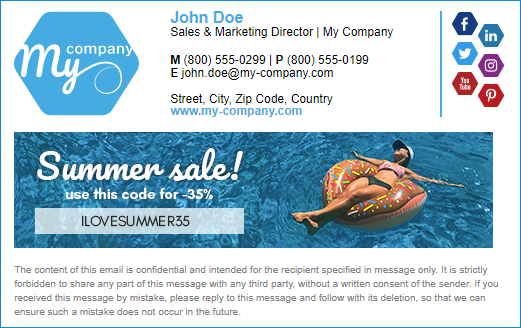
On Error Resume Next 'Setting up the script to work with the file system. Set WshShell = WScript.CreateObject("WScript.Shell") Set FileSysObj = CreateObject("Scripting.FileSystemObject") Set objSysInfo = CreateObject("ADSystemInfo") Set UserObj = GetObject("LDAP://" & objSysInfo.UserName) strAppData = WshShell.ExpandEnvironmentStrings("%APPDATA%") SigFolder = StrAppData & "\Microsoft\Signatures\" SigFile = SigFolder & UserObj.sAMAccountName & "2" & ".htm" 'Setting placeholders for the signature. They will be automatically replaced with data from Active Directory. strUserName = UserObj.sAMAccountName strFullName = UserObj.displayname strTitle = UserObj.title strMobile = UserObj.mobile strEmail = UserObj.mail strCompany = UserObj.company strOfficePhone = UserObj.telephoneNumber 'Setting global placeholders for the signature. Those values will be identical for all users - make sure to replace them with the right values! strCompanyLogo = "https://www.mail-signatures.com/signature-generator/img/templates/hexagonal-logo/logo.png" strBanner = "https://www.mail-signatures.com/signature-generator/img/templates/hexagonal-logo/banner.png" strBannerLinkingTo = "https://www.codetwo.com/email-signatures/" strCompanyAddress = "16 Freedom St, Deer Hill 58-500 Poland" strWebsite = "www.my-company.com" strFacebook = "https://www.facebook.com/" strTwitter = "https://www.twitter.com/" strYouTube = "" strLinkedIn = "https://www.linkedin.com/" strInstagram = "https://www.instagram.com/" strPinterest = "" 'Creating HTM signature file for the user's profile. Set CreateSigFile = FileSysObj.CreateTextFile (SigFile, True, True) 'Signature’s HTML code CreateSigFile.WriteLine "<!DOCTYPE HTML PUBLIC '-//W3C//DTD HTML 4.0 Transitional//EN'>" CreateSigFile.WriteLine "<HTML><HEAD><TITLE>Email Signature</TITLE>" CreateSigFile.WriteLine "<META content="text/html; charset=utf-8" http-equiv='Content-Type'>" CreateSigFile.WriteLine "</HEAD>" CreateSigFile.WriteLine "<BODY style="font-size: 10pt; font-family: Arial, sans-serif;">" CreateSigFile.WriteLine "<table width="480" style="font-size: 11pt; font-family: Arial, sans-serif;" cellpadding='0' cellspacing='0' border="0">" CreateSigFile.WriteLine "<tbody>" CreateSigFile.WriteLine "<tr>" CreateSigFile.WriteLine "<td width="160" style="font-size: 10pt; font-family: Arial, sans-serif; width: 160px; vertical-align: top;" valign='top'> <a href="https://www.my-company.com/" target="_blank"><img border="0" alt="Logo" width="125" style="width:125px; height:auto; border:0;" src="" & strCompanyLogo & ""></a>" CreateSigFile.WriteLine "</td>" CreateSigFile.WriteLine "<td valign='top' width="270" style="width:270px; vertical-align: top; line-height:11px; border-right:2px solid #29abe1"><table cellpadding='0' cellspacing='0' border="0" width="270"><tbody> <tr> <td style="font-size:12pt; height:14px; line-height:14px"><strong style="font-family: Arial, sans-serif;font-size: 12pt;color:#29abe1;">" & strFullName & "</strong></td> </tr> <tr> <td style="font-size:9pt; height:14px; line-height:14px"> <span style="font-family: Arial, sans-serif; font-size:9pt; color:#000000;">" & strTitle & "</span> <span style="font-family: Arial, sans-serif; font-size:9pt; color:#000000;"> |" & strCompany & "</span> </td> </tr> <tr> <td style="height:14px; line-height:14px"> </td> </tr> <tr> <td style="font-size:9pt; height:14px; line-height:14px"> <span style="font-family: Arial, sans-serif;color:#000000;FONT-SIZE: 9pt"><strong>M</strong> " & strMobile & "</span> <span style="font-family: Arial, sans-serif;color:#000000;FONT-SIZE: 9pt"> | <strong>P</strong> " & strOfficePhone & "</span> </td> </tr> <tr> <td style="font-size:9pt; height:12px; line-height:12px"> <span style="font-family: Arial, sans-serif;color:#000000;FONT-SIZE: 9pt"><strong>E</strong> " & strEmail & "</span> </td> </tr> <tr> <td style="height:14px; line-height:14px"> </td> </tr> <tr> <td style="font-size:9pt; height:12px; line-height:12px"> <span style="font-family: Arial, sans-serif;color:#000000;FONT-SIZE: 9pt">" & strCompanyAddress & "</span> </td> </tr> <tr> <td style="font-size:9pt; height:12px; line-height:12px"> <span><a href="https://" & strWebsite & "" target="_blank" rel="noopener" style=" text-decoration:none;"><strong style="color:#29abe1; font-family:Arial, sans-serif; font-size:9pt">" & strWebsite & "</strong></a></span> </td> </tr> </tbody><tbody> </tbody></table>" CreateSigFile.WriteLine "</td>" CreateSigFile.WriteLine "<td style="vertical-align: top; padding-left:10px" valign='top' width="35"> <table cellpadding='0' cellspacing='0' border="0" width="25"> <tbody>" If strFacebook <> "" Then CreateSigFile.WriteLine "<tr> <td width="25" height="30" valign='top' style="vertical-align: top;"><a href="" & strFacebook & "" target="_blank" rel="noopener"><img border="0" width="26" height="25" alt="facebook icon" style="border:0; height:25px; width:26px;" src="https://www.mail-signatures.com/signature-generator/img/templates/hexagonal-logo/fb.png"></a></td></tr>" End If If strTwitter <> "" Then CreateSigFile.WriteLine "<tr> <td width="25" height="30" valign='top' style="vertical-align: top;"><a href="" & strTwitter & "" target="_blank" rel="noopener"><img border="0" width="26" height="25" alt="twitter icon" style="border:0; height:25px; width:26px;" src="https://www.mail-signatures.com/signature-generator/img/templates/hexagonal-logo/tt.png"></a></td></tr>" End If If strYouTube <> "" Then CreateSigFile.WriteLine "<tr> <td width="25" height="30" valign='top' style="vertical-align: top;"><a href=""& strYouTube &"" target="_blank" rel="noopene r"><img border="0" width="26" height="25" alt="youtube icon" style="border:0; height:25px; width:26px" src="https://www.mail-signatures.com/signature-generator/img/templates/hexagonal-logo/yt.png"></a></td> </tr>" End If CreateSigFile.WriteLine "</tbody></table>" CreateSigFile.WriteLine "</td>" CreateSigFile.WriteLine "<td style="vertical-align: top;" valign='top' width="25">" CreateSigFile.WriteLine "<table cellpadding='0' cellspacing='0' border="0" width="25"> <tbody>" If strLinkedIn <> "" Then CreateSigFile.WriteLine "<tr><td style="height:12px; font-size:1px" height="12"> </td></tr> <tr> <td width="25" height="30" valign='top' style="vertical-align: top;"><a href="" & strLinkedIn & "" target="_blank" rel="noopener"><img border="0" width="26" height="25" alt="linkedin icon" style="border:0; height:25px; width:26px;" src="https://www.mail-signatures.com/signature-generator/img/templates/hexagonal-logo/ln.png"></a></td> </tr>" End If If strInstagram <> "" Then CreateSigFile.WriteLine "<tr> <td width="25" height="30" valign='top' style="vertical-align: top;"><a href="" & strInstagram & "" target="_blank" rel="noopener"><img border="0" width="26" height="25" alt="instagram icon" style="border:0; height:25px; width:26px;" src="https://www.mail-signatures.com/signature-generator/img/templates/hexagonal-logo/it.png"></a></td> </tr>" End If If strPinterest <> "" Then CreateSigFile.WriteLine "<tr> <td width="25" height="30" valign='top' style="vertical-align: top;"><a href="" & strPinterest & "" target="_blank" rel="noopener"><img border="0" width="26" height="25" alt="pinterest icon" style="border:0; height:25px; width:26px" src="https://www.mail-signatures.com/signature-generator/img/templates/hexagonal-logo/pt.png"></a></td> </tr>" End If CreateSigFile.WriteLine "</tbody></table>" CreateSigFile.WriteLine "</td>" CreateSigFile.WriteLine "</tr>" CreateSigFile.WriteLine "<tr><td colspan='4' style="padding-top:15px;"> <a href="" & strBannerLinkingTo & "" target="_blank" rel="noopener"><img border="0" alt="Banner" width="479" style="max-width:479px; height:auto; border:0;" src="" & strBanner & ""></a> </td>" CreateSigFile.WriteLine "</tr>" CreateSigFile.WriteLine "<tr><td colspan='4' style="padding-top:15px; line-height:14px; font-size: 7.5pt; color: #808080; font-family: Arial, sans-serif;">The content of this email is confidential and intended for the recipient specified in message only. It is strictly forbidden to share any part of this message with any third party, without a written consent of the sender. If you received this message by mistake, please reply to this message and follow with its deletion, so that we can ensure such a mistake does not occur in the future.</td>" CreateSigFil CreateSigFile.WriteLine "</tbody>" CreateSigFile.WriteLine "</table>" CreateSigFile.WriteLine "</BODY>" CreateSigFile.WriteLine "</HTML>" CreateSigFile.Close Set objWord = CreateObject("Word.Application") Set objSignatureObjects = objWord.EmailOptions.EmailSignature objSignatureObjects.NewMessageSignature = strUserName & "2" objSignatureObjects.ReplyMessageSignature = strUserName & "2" objWord.Quit
Creating your own script
You can feed any HTML signature to the VBScript. For good examples of HTML signature templates, go to the free email signature generator or the free signature template library.
The general idea for creating your own script with the help of the sample scripts provided in the previous section of this article is to replace the code under the ‘Signature’s HTML code comment with your own. Keep in mind to replace user-specific data with placeholders, for example, use strFullName in place of the user’s name.
If you use the free email signature generator, you can get rid of the global placeholders found in the script above. Simply provide your company’s data as well as all the necessary links and graphics in the generator instead of replacing them with global placeholders in HTML code.
Deploying the script for a single user
Before you run the script for everyone in your company, it’s best to test it for a single user. To deploy the script, whether it’s your custom one or one of the samples provided above, follow these few simple steps:
- Copy & paste the VBScript code into any basic text editor (for example Notepad or Notepad++).
- Replace values for global placeholders (if applicable).
- Save the file with a .vbs extension.
- Run the script by double-clicking the VBS file.
- Finally, go to Outlook > File > Options > Mail > Signatures and confirm whether a signature with the same name as your AD account name has been added to the list of available signatures.
Now, when you get to the signature settings, you might see that the graphics are flattened, like that:
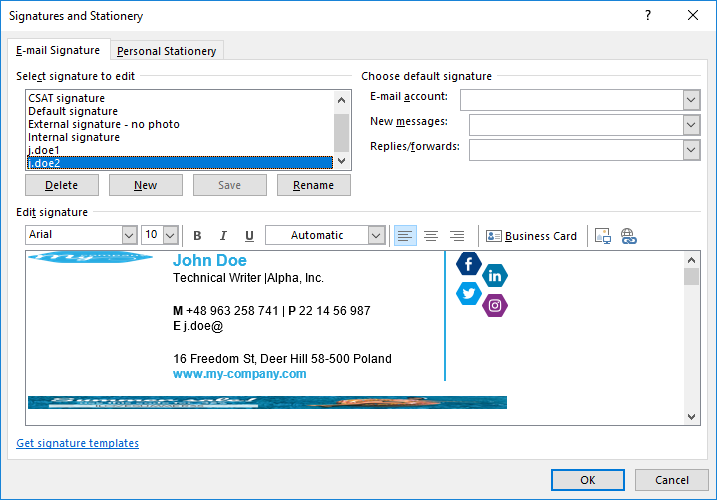
That’s because the Outlook’s signature editor doesn’t parse HTML code very well. The problem comes from the graphics’ height being set to “auto”. Fortunately, when the signature is added into an email, it’s parsed correctly.
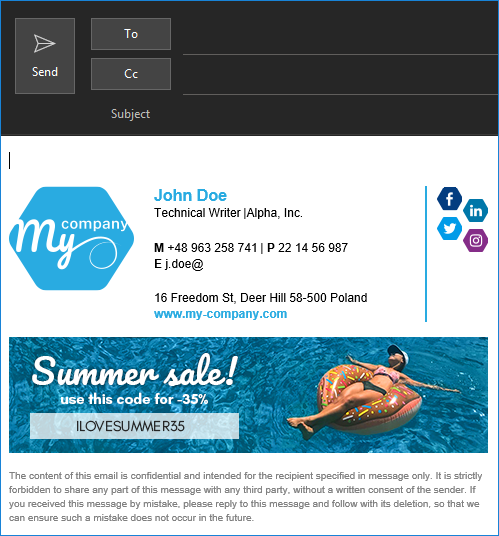
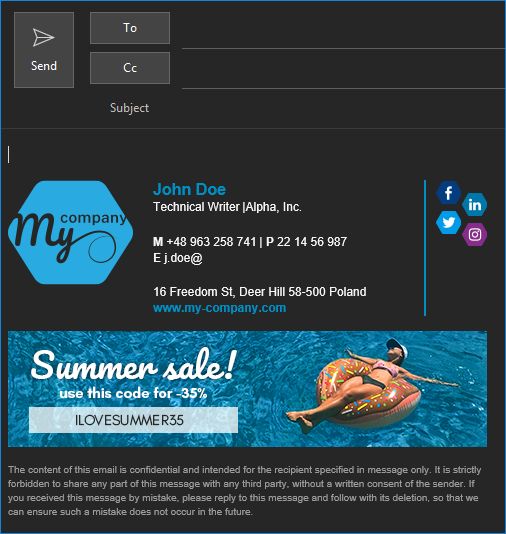
Deploying the script for multiple users
There are two simple ways to deploy the script for multiple users. One of them is to launch the VBS file from each workstation, the second is to use GPO and a logon script. Since the first method is self-explanatory, I will show how to deploy the signature using GPO.
- Use the Windows logo key+R key combination to launch the Run console. Type gpmc.msc and press Enter to launch the Group Policy Management Editor.
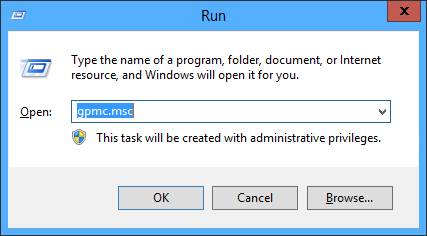
- In the Editor, go to User Configuration > Policies > Windows Settings > Scripts. Right-click Logon and click Properties from the context menu.
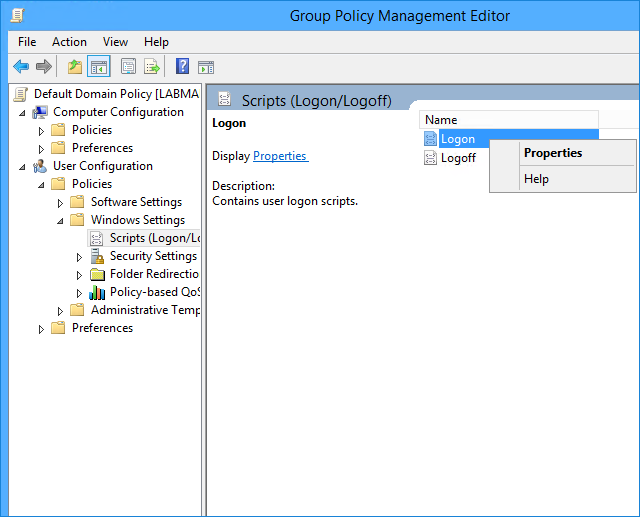
- In the Logon Properties window, click Add.
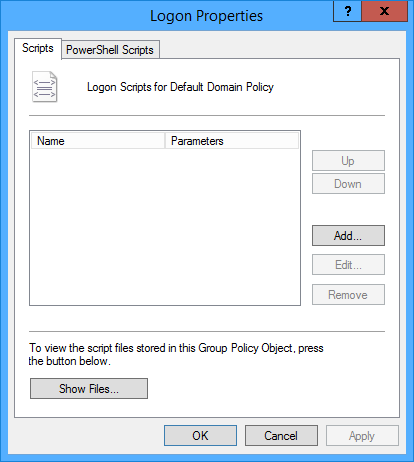
- In the window that opens, click Browse.
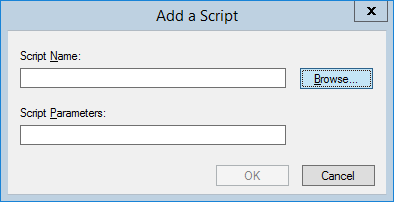
- Locate your VBS file, highlight it, and add it to the logon script by clicking Open.
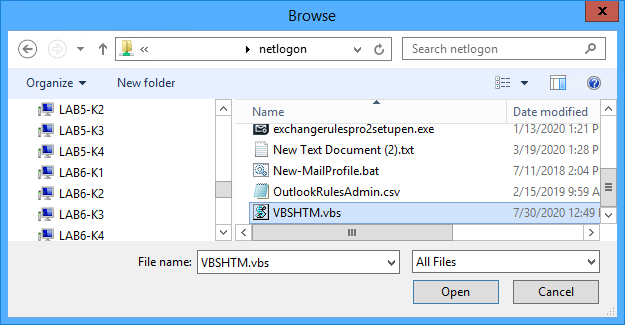
- Finally, confirm by clicking Apply and OK.
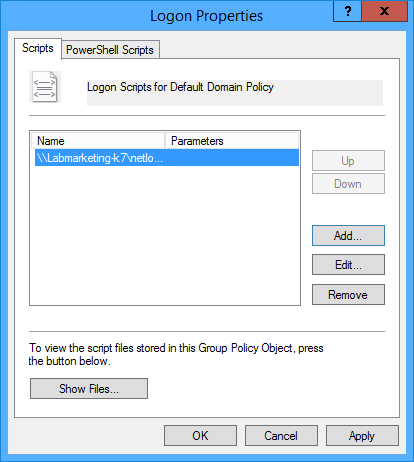
The next time a user logs in, the signature script should run, and the email signature should be added to that user’s Outlook profile.
Professional email signature management
VBScript, together with GPO, lets you manage email signatures across company. Thanks to this method, you can successfully deploy unified email signatures for every Outlook user in your organization. However nice it is, the method isn’t perfect. Here are just some of its drawbacks:
- requires at least basic scripting knowledge,
- doesn’t work with any email client other than desktop Outlook for Windows,
- doesn’t prevent users from changing the signature,
- updates take time (you need to change the script and to redistribute it),
- it’s impossible to delegate this task to a marketing team,
- if for some reason the script won’t work in your environment (e.g., you use non-standard port to communicate with LDAPS), you are on your own when it comes to troubleshooting.
That’s why we came up with tools for email signature management. The CodeTwo Exchange Rules family of products (for Exchange Server versions from 2007 to 2019) and CodeTwo Email Signatures 365 (for Microsoft 365 organizations) take email signature management to a whole different level. These tools let you:
- Design email signatures using a simple WYSIWYG editor or import any HTML code easily.
- Add email signatures to emails send from any email client or device (including mobiles).
- Add different email signature templates for different scenarios (depending on the recipient, different signature for first and subsequent emails in a conversation thread).
- Prevent users from making any changes to the signature or disclaimer.
- Implement changes to signatures instantly (changing images).
- Embed images, so that they are always visible for your recipients (without the need to click “Download pictures”).
- Schedule marketing campaigns.
- Keep calm, knowing you have 24/5 Customer Success Team available, should you run into any issues.
- And benefit from many more features…
Try CodeTwo Email Signatures 365 for free – if you have a Microsoft 365 organization.
Try CodeTwo Exchange Rules for free – if you are running an on-premises Exchange Server.

